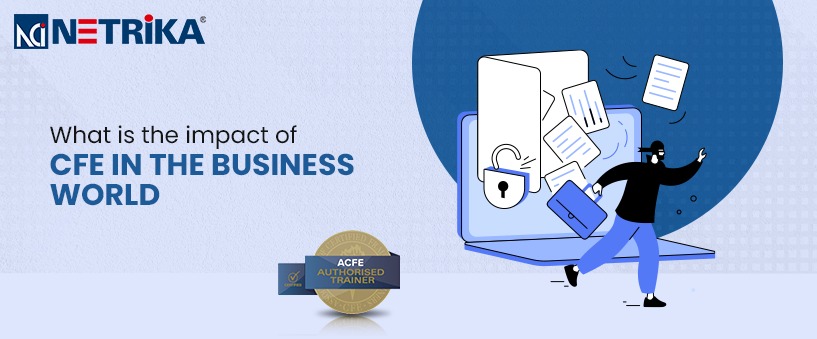News & Events
What is the impact of CFEs in the business world
- August 17, 2023
- Posted by: marketing@netrika.com
- Category: Blogs

Organisations face a slew of obstacles in today’s complicated and fast-paced business climate, one of the most serious being the possibility of fraud. Fraud has the potential to devastate a company’s financial stability, reputation, and overall performance. Certified Fraud Examiners (CFEs) have emerged as a critical resource for organisations globally in combating this prevalent issue. CFEs are professionals who have received training in the identification, deterrence, and prevention of fraud.
This blog looks at the major impact that a CFE’s certification has in the corporate sector and how a certified fraud examiner’s knowledge helps firms protect themselves from fraudulent actions.
Impact of CFE certification
Certified Fraud Examiners (CFEs) perform diverse functions in the corporate sector, including fraud detection, investigation, prevention, risk assessment, collaboration, education, and ethical behaviour.
Their knowledge and passion help to prevent organisations from engaging in fraud, protect stakeholders, and promote ethical business practices. CFEs act as trusted professionals in the battle against fraud, safeguarding corporate integrity and sustainability. Furthermore, Certified Fraud Examiners (CFEs) play an important role in combating fraud and protecting organisations from financial and reputational harm.
The Role of Certified Fraud Examiners (CFEs) in the business world:
- Enhancing Fraud Detection: CFEs have specialised knowledge and abilities that allow them to recognise signals of fraudulent behaviour within organisations. Certified Fraud Examiners discover red flags, analyse financial data, and gather evidence to expose fraudulent activity by conducting thorough investigations and using forensic accounting procedures. Their knowledge of internal controls, data analysis, and interviewing procedures enables them to spot fraudulent schemes that might otherwise go undetected. CFEs serve as the first line of protection, minimising financial losses and reputational damage caused by fraud.
- Strengthening Internal Controls: A CFE’s primary responsibility is to examine and improve internal controls inside an organisation. They assess current systems and procedures, find flaws and vulnerabilities, and provide recommendations to improve controls. CFEs contribute to the creation of a strong anti-fraud framework by implementing rigorous internal controls such as segregation of roles, frequent audits, and fraud prevention programmes. This proactive strategy decreases the likelihood of fraud occurring and serves as a deterrent to potential perpetrators.
- Conducting Comprehensive Fraud Risk Assessments: Certified Fraud Examiners are critical in conducting comprehensive fraud risk assessments for firms. They assess an organization’s vulnerabilities and provide risk mitigation solutions that are suited to its specific requirements. A CFE course enables professionals to use their expertise to identify the most vulnerable and create proactive methods to limit such risks. CFEs help organisations save large resources that might otherwise be wasted on fraud by focusing on prevention rather than detection alone.
- Assisting in Investigations and Legal Proceedings: When fraud occurs, Certified Fraud Examiners play an important role in gathering evidence, determining the amount of the crime, and identifying the individuals involved. To guarantee a thorough and effective investigation, they work with internal stakeholders, legal teams, and law enforcement agencies. CFEs have the abilities required to collect and analyse evidence, interview witnesses, and present conclusions in a legal setting. Their assistance is vital in assisting with the prosecution of fraudsters and the recovery of assets, assisting organisations in achieving justice, and deterring future fraudulent acts.
- Raising Awareness: Certified Fraud Examiners are also important in teaching employees and raising awareness about fraud within organisations. They offer training sessions, conferences, and seminars to assist employees in recognising indicators of fraud, understanding their ethical responsibilities, and reporting suspicious actions. They establish an environment where fraud is less likely to occur by creating a culture of honesty and responsibility. CFEs empower employees at all levels to actively participate in fraud prevention through their instructional initiatives.
- Safeguarding Reputation: The negative impact of fraud on a company’s reputation cannot be understated. News of fraudulent operations can significantly harm public trust, investor confidence, and stakeholder relationships. Certified Fraud Examiners protect an organization’s reputation by effectively detecting and preventing fraud. Their presence sends a clear message to employees and third-party stakeholders that fraud will not be tolerated, presenting the organisation as a trustworthy and reliable institution.
Rundown
The presence of Certified Fraud Examiners (CFEs) has a tremendous impact on the corporate sector since they provide specialised skills to effectively combat fraud. CFEs contribute to the overall integrity and sustainability of organisations by assisting in investigations, educating staff, and protecting reputations. Aspirants who earn the CFE course from ACFE play a critical role in protecting financial assets, preserving reputations, and assuring long-term success in a world where fraud offers serious challenges to enterprises.
Investing in CFEs is a proactive move that businesses may take to protect themselves against the ever-present threat of corporate fraud.

